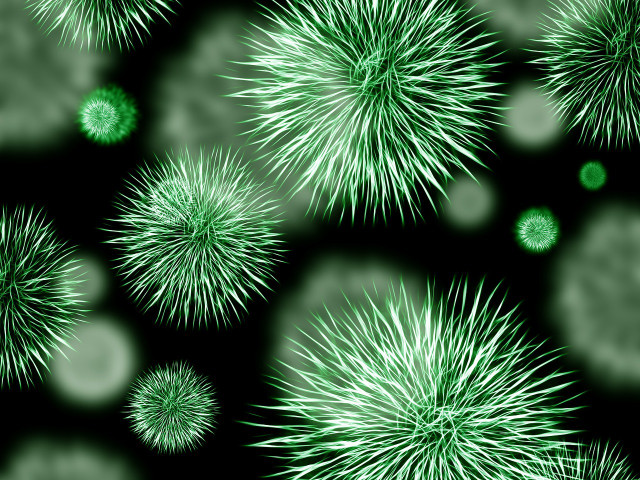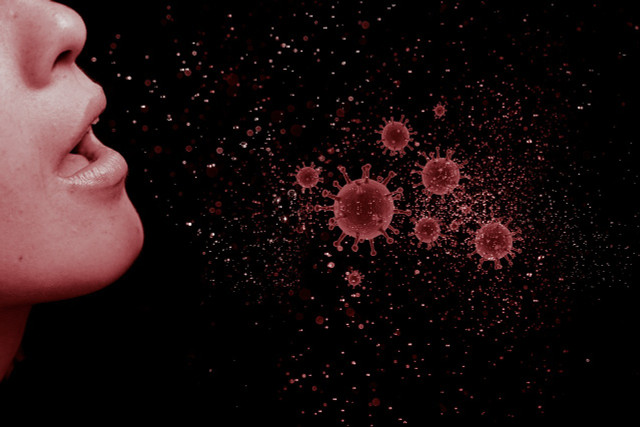
Depending on whether you have a bacterial or viral infection, different medications are used. You can find out exactly where the differences are and what you should consider here.
If you feel sick, a bacterial or viral infection is often the cause. The responsible bacteria and viruses are pathogens that can cause similar symptoms. Both cannot be seen with the naked eye – as far as the similarities go.
Basically, however, bacteria and viruses differ in their structure and function. There are therefore also important differences in the diagnosis and treatment of bacterial and viral infections.
Bacteria and Viruses: The Biological Difference

(Photo: CC0 / Pixabay / geralt)
Bacteria or viruses are the trigger behind a bacterial or viral infection. The main biological difference between the two pathogens is that bacteria are living things, while viruses are not.
Bacteria are unicellular organisms. Bacteria have the ability to multiply through cell division. Your cell membrane encloses an independent, viable cell with its own metabolism. Bacteria can have a wide variety of shapes, from rod-shaped to spherical.
The most common bacterial pathogens include, for example, streptococci, Escherichia coli, staphylococci and salmonella. However, not every type of bacteria is a pathogen. There are also so-called “good” bacteria. Among other things, they help the body to maintain its protective system. Bacteria on the skin or in the gut help fight off other pathogens.
From a biological point of view, viruses are not living beings. They lack the basic requirement for life: their own metabolism. A virus is a protein shell that encloses the genetic material (genome). Viruses can be divided into two groups on the basis of the genome: the genome either consists of a single strand, the RNA, or of a double strand, the DNA. Unlike bacteria, viruses depend on a host cell. They only multiply with the help of the host cell, which they confiscate for their purposes.
Viruses can also have a good side: According to the science magazine Spektrum, human development would be inconceivable without them. Researchers assume that viruses existed before there were any living beings on earth. In the course of human evolution, viruses and human cells have become closely associated. A small percentage of the human genome consists of viral DNA. Among other things, they support the immune system and the brain. Viral DNA sequences even play a role in pregnancy. They are involved in making protective proteins for the embryo.
Bacterial or viral infection? The medical differences

(Photo: CC0 / Pixabay / mohamed_hassan)
Bacterial or viral infections are the cause of a whole range of diseases. Some examples:
-
Bacterial diseases – Common diseases caused by bacteria include inflammation of the lungs, tonsils, middle ear or bladder, and food poisoning. Other diseases caused by bacterial infections are, for example, whooping cough, scarlet fever, tetanus, diphtheria, cholera, typhoid or the plague and the venereal disease gonorrhea.
-
Viral diseases – Viral infections are, for example, the trigger of colds, bronchitis, flu (influenza), herpes, mumps, measles, rubella, smallpox, polio, AIDS (HIV) as well as SARS and Covid-19. But viruses can also cause inflammation in the pharynx, in the gastrointestinal tract (norovirus), in the tonsils or in the liver (viral hepatitis).
The transmission paths are again quite similar for bacterial and viral effects. Transmission is often by droplet or smear infection. In the case of droplet infection, coughing or sneezing releases small droplets containing the pathogen. A smear infection usually occurs when you touch a surface infected with a virus or bacteria.
But there are also differences in the transmission:
-
Bacteria – Another possibility of bacterial infection is infection through contaminated food, for example salmonella.
-
Viruses – Insects can transmit viruses. This is the case, for example, with Nile fever, which is also becoming more and more common in Germany. Due to global warming, the West Nile mosquito is encroaching further and further north.
Bacterial and viral infections: differences in treatment
In order to be able to treat bacterial or viral infections properly, it is important to know what causes them. The symptoms do not always give clear indications of whether it is a bacterial or viral infection. Not only bacteria, but also viruses can cause tonsillitis or pneumonia, for example. Many diseases also begin very unspecifically with you feeling tired and listless. Then there may be a fever.
In any case, you should seek medical advice for such symptoms, because only a medical diagnosis can clarify whether it is a bacterial or a viral infection. The Apotheken-Umschau, for example, emphasizes that a reliable diagnosis of the pathogen is usually only possible through an examination in the laboratory. This requires a swab or a stool sample.
-
Bacteria form a bacterial culture on a suitable culture medium. They can be identified in the laboratory analysis in this way.
- For viruses, on the other hand, an antibody test is required. The sample is examined for special antibodies that the body produces to fight a viral infection.
The treatment of a bacterial infection is fundamentally different from a viral infection.
-
Bacteria – Antibiotics are only effective for bacterial infections. They prevent further reproduction. In the case of a viral infection, however, antibiotics are ineffective. The Federal Center for Health Education warns that incorrect or excessive use contributes to the increase in bacteria resistant to antibiotics. Resistant bacteria such as the so-called hospital germs (MRSA) can lead to serious illnesses. The Federal Ministry of Health also reports deaths related to resistant bacteria. If there is no alternative to antibiotics in treatment, always follow the doctor’s instructions closely.
-
Viruses – According to Netdoktor, viral infections are mainly treated with antiviral agents, the antivirals. These preparations inhibit the spread. However, they cannot completely destroy the virus. For some viruses, vaccination can protect against acute infections. Examples of this are influenza or Covid-19.
Bacterial or viral infection: This is how you can protect yourself

(Photo: CC0 / Pixabay / silviarita)
An efficient immune system offers protection against bacterial or viral infections. Hygiene is important so that your immune system does not even have to take action. Regular hand washing and cleaning of surfaces inhibits the transmission of bacteria or viruses.
The doctors at the Munich clinic recommend, among other things, these additional measures to strengthen your immune system:
-
Eating healthy – Fruits and vegetables contain vitamins and nutrients that help boost your immune system. These are primarily vitamin C, vitamin A and vitamin D as well as the trace elements zinc, selenium and iron. Incidentally, spicy food also helps: Chili has an anti-inflammatory effect. If you have a blocked nose, the mustard oils in horseradish or Japanese wasabi promote blood circulation in the mucous membranes so that you can breathe easier again. You should also drink enough water. Experts recommend up to two liters a day. In winter, the heating air dries out the mucous membranes and can make them more susceptible to colds and the like.
-
Reduce Stress – Stress releases the hormone cortisol in the body, which impairs the functioning of the immune system. So if you are stressed frequently, this weakens your immune system in the long run. With these tips you can reduce stress and slow down your life.
-
Sufficient sleep – At night, when the body is resting, the immune cells are particularly active. You can act undisturbed against intruders. An evening routine will help you fall asleep better.
-
Exercise in the great outdoors – exercise stimulates the immune system and sunlight activates the immune cells. Sports such as jogging, cycling or hiking are ideal for the immune system. However, the Munich clinic warns against overloading: it has the exact opposite effect and weakens the body. You will achieve the best effect with moderate training, in which you do not go to your performance limits.
Read more on Techzle.com:
- Flu: symptoms, duration, tips on prevention and vaccination
- Strengthen the immune system: 10 natural tips for better defences
- Catches? These 6 herbal home remedies help with a cold